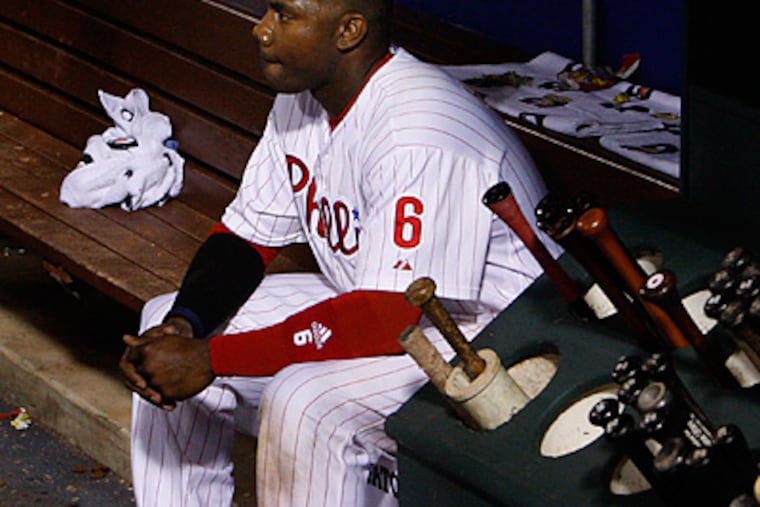Paul Hagen: Stats maven downplays Howard's protection
LAKE BUENA VISTA, Fla. - Jayson Werth followed the money to Nationals Park. A couple of potential replacements, free agents Matt Diaz and Jeff Francoeur, have signed elsewhere since the winter meetings started.

LAKE BUENA VISTA, Fla. - Jayson Werth followed the money to Nationals Park. A couple of potential replacements, free agents Matt Diaz and Jeff Francoeur, have signed elsewhere since the winter meetings started.
It's more than 2 months until pitchers and catchers will once again convene at the Carpenter Complex is Clearwater. Plenty of time to make a move, formulate a plan. Still, worry lines are beginning to form on the collective forehead of Phillies Nation.
Who, inquiring minds demand, is going to bat fifth for manager Charlie Manuel next season? Or, to put it another way, who will be the big bopper who will be slotted behind Ryan Howard to provide lineup protection for the expensive cleanup hitter?
Because as everybody knows, without a legitimate righthanded threat behind him, Howard won't get a pitch to hit all season long.
The kicker, of course, is that conventional wisdom frequently is somewhere between off base and flat wrong. And Gary Gillette, a writer and member of the board of directors of the Society for American Baseball Research, suggests that fretting about who will replace Werth in that slot is probably much ado about nothing.
"Everything I've looked at in the past has either showed no effect or minimal effect. In fact, sometimes it was the opposite," he said yesterday at the Disney Swan and Dolphin Resort.
"I think the reason for that is that it's not really connected. If you think about it, people don't want to pitch to Miguel Cabrera or Ryan Howard any time. It's just that they're forced to sometimes. If the season was composed of all pressure points, you might see a big effect. But since there are lots of ordinary at-bats, it's hard to see."
The reality is that with Werth as the regular guy on deck when Howard batted last season, the big first baseman hit 14 fewer homers (31) and drove in 28 fewer runs (108) than his previous full-season lows. Manuel said part of that was due to the sprained ankle that landed him on the disabled list. Gillette hypothesizes that this most likely would have been the case regardless of who batted fifth.
"My theory is that there are 10 or 15 factors in any at-bat that impact what the pitcher's going to do and what the hitter's trying to do. The outs. The inning. The runners on base. The team. Who's in the bullpen. The weather. The individual pitcher-batter matchup. All that stuff. And when you get to the point of, 'Am I going to pitch this guy differently because of who's in the on-deck circle?' it's a very minor factor," he said.
"Personally, I think it has a very marginal effect."
Manuel is an old-fashioned baseball guy who might not be impressed with the efforts to explain everything that happens between the lines with fancy mathematical formulas. And he has nothing but good things to say about how much Werth meant to the team.
That doesn't translate into much apparent angst about who will fill that role in 2011, however.
"I think we're still OK. I think we can maneuver our lineup," he said casually. "There is a chance we're going to miss Werth because he's a good player and because of all the things he did for us. At the same time, somebody always steps up, the game keeps moving along. We've been in baseball a long time, and that's how you look at it. You got to go try to find somebody that's going to replace him. We're going to find somebody to hit behind Howard."
There's another point to be made here. The point of a lineup is not to feature one player. It's to maximize the number of runs a team scores.
So how often Jimmy Rollins, Placido Polanco and Chase Utley get on base in front of Howard is more crucial to how many RBI he gets than who bats behind him. And if he doesn't get good pitches to hit, he has to be disciplined enough to take a walk if he isn't seeing something he can handle.
It's also worth pausing to note that pitchers aren't perfect, either.
"One of my other theories is that guys like Howard and Cabrera learn to hit with pitchers trying to pitch around them, that they adjust their hitting," Gillette said. "They don't necessarily starting swinging at sliders 4 inches outside. But they learn most pitchers aren't good enough to be that fine. They might mean to place a slider 2 inches outside but they get it 3 inches closer and that could be hit out of the park. These guys are really good at hitting mistakes. It may not look like one, but it may be a mistake if Ryan Howard hits the ball over the wall in right-center."
Manuel said he expects Howard to hit between 40 and 50 home runs in 2011, with 125 to 140 RBI. "That's kind of who he is. That's who I think he is," the manager said.
No matter who is batting behind him.
Send e-mail to hagenp@phillynews.com.